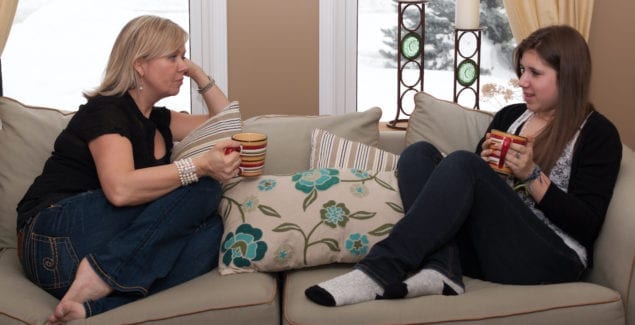The Positive Value of Conflict Resolution

Posted in: Hot Topics, You & Your Family
Topics: Culture + Society, Relationships
Are you an educator? You may be interested in our Conflict Resolution Curriculum for students. Learn more here.
Conflict is a natural part of our lives. We inevitably have disagreements with others from time to time in our values, beliefs, behavior, and much more. But recently, we’ve seen what feels like insurmountable conflict dividing our nation. How do we even start to move toward some kind of resolution?
Let me put on my shrink hat, and focus on conflict in families and relationships. As noted in a previous post on healing, maybe we can learn how to put our conflicts to rest nationally if we start closer to home.
In my clinical experience, relationships become stronger, more enduring, and closer through the resolution of a conflict. But resolution takes practice. Resolving conflict requires building interpersonal skills that are essential for loving and effective relationships at home, with friends, and in our communities. The process of working through a conflict is also a crucial way for us to build resilience and learn more about ourselves and others. We are never too young to start building these skills, as the benefits can last a lifetime.
In families, there are two situations that worry me, clinically:
- Families that never fight, where there is no apparent conflict, or hidden conflict.
- Families in which the conflict is overt, often brutal, and hurtful.
What is common in these two situations is the lack of conflict resolution.
In one situation, conflict is denied or hidden. In the other, feelings of rage, harshness, or rigidity do not allow for peace and reconciliation. In both cases, conflict eats away at the needed attachment we have for each other in families, and takes a toll not only on the relationship, but on one’s personal sense of security, acceptance, and self-esteem.
Here is the major premise: we are all going to have conflict at times – it’s a fundamental fact of human relationships. But when we make the conflict transparent, when we take accountability for our role in the conflict, and when we resolve the conflict, we become closer. Our attachment and sense of belonging improve immensely.
A Guide to Conflict Resolution
Resolution does not necessarily mean we agree. We can agree to disagree. Resolution does involve:
- appreciation of differences
- acceptance
- tolerance
- an ability to love each other, despite our disagreements
In many conflicts, it’s apparent what’s going on – perhaps a fight over rules, a behavior, or differing opinions. But sometimes it’s harder to get to the root of things, and while the parties don’t necessarily have the skills or insight to manage the situation, it’s still clear that there is some kind a rift.
When conflict is not transparent, we might only see the impact of the conflict in a child or teen’s behavior. For example, in a marital conflict, a child might demonstrate angry, oppositional behavior or physical symptoms, such as abdominal pain. Kids pick up on the rift between parents unconsciously, and it comes out in behavioral challenges. Sometimes they have these challenges because they cannot tolerate the non-transparent tension, or in other cases, to create a way of taking the heat off the family that is upsetting. The child’s symptom becomes the focus of the family, and this serves to keep the unspeakable conflict out of the limelight. The job here for the clinician is to help a family see where there is hidden conflict.
With these situations in mind, here are some tips.
- Have Open Conversations and Listen to Both Points of View. A conflict typically involves different views on an issue. Parents and kids need to pay close attention to the feelings and perceptions of everyone in the family, not just those involved in the conflict. A family is a woven texture of relationships, and disagreements affect everyone. Be open to hearing and validating all points of view. Try to understand and accept each other’s position, even if you disagree. Remember that problems or conflict take two (or at least two), so there are two or more sides to every story.
- Beware of Being Judgmental. No conflict can truly be resolved if anyone feels criticized, blamed, devalued, shamed, or humiliated. Take the stand that each of our beliefs is right in the eyes of the individual. Everyone is correct – at least as they see it! This levels the playing field. It does not mean you agree with the other person, but that you respect their right to have their own feelings and beliefs. It means you give another family member the benefit of the doubt. This skill – and it is a skill – requires setting your personal opinions aside, and listening to understand the other person. It’s not easy! And it’s the kind of skill that requires practice.
- Have Frequent Conversations and Keep Emotions Under Control. No big conflict is going to be resolved instantly. Plan on frequent talks, and if emotions get too hot, take breaks. I suggest that the conversations be scheduled at regular times. But prepare for the eye rolls of kids, who dread “family meetings.” I also suggest that if anyone is feeling overwhelmed, they can call for a “time out,” but set a time to resume the meeting. It is never a good idea to just leave and not come back, even if it is in a day or so.
- Be Prepared to Apologize. If you, a parent, or a child acts inappropriately – such as cursing at another family member – be prepared to apologize for your behavior. This goes a long way. Apologizing does not resolve the conflict, but it is part of the foundation we need for acceptance, tolerance, and staying connected with others – which are needed for conflict resolution. And beyond simply apologizing, learn to express remorse and concern for someone you may have hurt with your words or actions.
- Identify the Problem and Make a Plan. This may be the most difficult, particularly if there is covert or hidden conflict, say, between parents, and a young child is responding to the conflict with challenging behavior. In most situations, eventually the true problem can be made apparent – though there may be parental issues that are not wise to raise in front of younger children, such as infidelity, for example. But identify where the conflict lies, and try to define what it is as best as possible. For this step, be mindful of differences in opinion and take the “person” or “character” out of the equation. For example, it is not wise in resolving conflict to simply say, “Oh, that’s Charlie, he’s really an explosive person and he’s been that way since he was a baby.” It may be true that Charlie has a high level of expressed emotion, but he is responding to a conflict that triggers emotion – whether it’s not being allowed to play a video game or hang out with friends late at night, or responding to the tension in the family because a grandparent is dying. Once a problem is identified, we can try to come up with an action plan to address the conflict.
- Be Aware of Unconscious Conflict. Kids and parents may harbor ill feelings toward another family member for all sorts of reasons – they may not like the way someone behaves (such as screaming and yelling), or talks about another family member (such as another parent or sibling); or they may not like the way they are treated, which results in not feeling valued and low self-esteem. But these feelings may be unconscious, and if so, can have a serious negative impact on the other person. The reaction may come out in emotionally or behaviorally destructive ways, either toward the other person or themself. In these cases, resolving unconscious conflict will require eventually allowing it to become conscious. This may evolve from family conversations, or may require professional help.
- Assume Accountability – Everyone and No One is at Fault. When we can all recognize that we are part of the problem – that our frustration, judgement, or misbehavior is not because someone else is “bad” – we are on our way to resolving a conflict. Resolving a conflict requires understanding all points of view, accepting another person despite their beliefs, and recognizing the conflict is there because beliefs differ. We may have strong feelings against another’s belief, but it doesn’t mean they have done something wrong just because we feel that way. Our job is to learn to live with it, have ongoing and deepening conversations, and accept that we may even learn from our differences.
- Violence Should Never Be Tolerated In a Conflict. Though on occasion someone will have seriously violated a moral rule, such as stealing, destroying property, or disparaging another person, the answer to resolving this conflict is never resorting to violence. It’s the job of parents, as well as kids, to try to understand why an ethical code was broken. Then, we can manage with consequences and remediation.
- Consequence and Reparation Is Sometimes Part of the Solution. Let’s face it, some conflicts arise when someone seriously violates the rights of others. While we still need to understand and try to appreciate that rationale for the harmful behavior, a parent may need to impose a consequence for unacceptable behavior. This is not a bad thing. But the key is to set the stage in which a child can feel appropriate guilt, make amends, and accept that the consequence is warranted. All children and teens (and parents) want to feel loved and accepted. It is possible for a consequence to be cast, and a child to still feel loved, accepted, and valued.
- It’s Not About Winning – Learn to Live With Differences or Compromise. No one is going to agree on everything, nor practice the same behaviors. We are all different. Conflict resolution simply means that, despite our opposing points of view, we can come up with solutions to rifts that cause problems and live in peace. If getting up from the table requires asking to be excused, it may not be the end of the world for a 10-year-old to learn that in this household, that is the standard to which they must live.
- Seek Professional Help. Conflict resolution is not easy. It involves being honest, accepting responsibility, listening to others, and changing behavior. It means understanding your role in the conflict and coming up with a plan. All this is ideally done when a neutral, supportive third person is involved. For more complicated conflicts, professional help is quite valuable. This speaks to the value of family therapy, or in the work place or society, mediation and arbitration.
In my work as a therapist and as a parent, I have learned a few things. One of them is that, to quote my favorite psychiatrists, Donald Winnicott, “We succeed by our failures.” And one of the most common failures I have made is unconsciously blaming or criticizing a patient who is not behaving the way I want them to. That is a conflict. I have no control over the behavior of my patients, nor should I hold any kind of bias against them. When I have made this kind of mistake, my duty is to understand my own bias, openly discuss the impact on my patient, and apologize. In all cases when I have done this – as both a clinician and a parent – I reflected on my role in the conflict and fostered a resolution, and the relationship has become stronger.
I hope that we can take some of the lessons of conflict resolution to heart. We should embrace conflict and work toward its resolution. I hope we can use it to mend fences in our homes and in our nation.
Was this post helpful?
Newsletter
Subscribe Today
Your monthly dose of the latest mental health tips and advice from the expert team at The Clay Center.
SubscribeMultimedia
Quick Jumps
Tag Cloud
-
addiction
ADHD
adolescents
anorexia
anxiety
autism
behavior
CBT
child development
children
college
communication
covid-19
depression
digital media
dyslexia
eating disorder
evaluation
family
fear
healthy development
learning
learning disabilities
learning disability
mental health
mental illness
parenting
parents
Podcast
PTSD
relationships
resilience
school
shrinking it down
social media
stigma
stress
suicide
technology
teenagers
teens
therapy
trauma
treatment
violence

 Share
Share Tweet
Tweet





